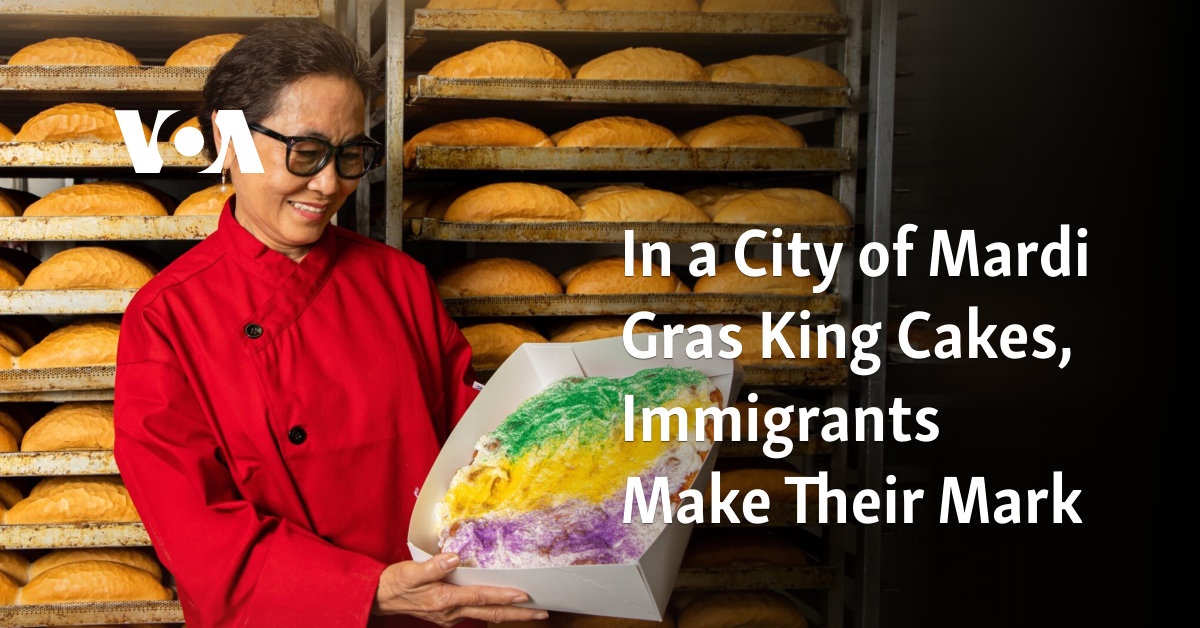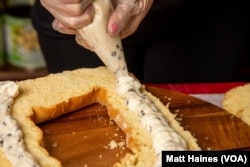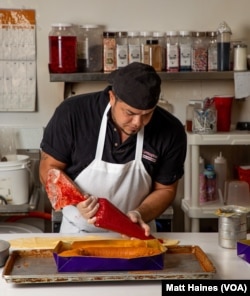Mardi Gras in New Orleans is marked by creative costumes, parades, music and plenty of imbibing and feasting.
At the culinary center of this celebration is the king cake — a ring-shaped confection often made from brioche, flavored with cinnamon, and covered in icing and purple, green and gold sugar.
This custom that has thrived in southeastern Louisiana for generations is going through a transformation as various immigrant groups put their own spin on Carnival season’s seminal treat.
“If you’re someone who makes or bakes sweets for a living in New Orleans, you’re almost certainly going to sell king cake this time of year,” explained Liz Williams, founder of the Southern Food and Beverage Museum in New Orleans. “But whereas generations of Louisiana’s king cake lovers enjoyed one traditional version of the cake, today, we see new kinds pop up each year.”
Williams added, “It’s a tradition that’s evolving in front of our eyes in large part because you have people moving to New Orleans from all over the world. They fall in love with our traditions, and then — especially in the case of king cake — they add a twist that reflects where they’ve come from.”
That includes Japanese restaurants that make sushi king cake, a Cuban pop-up that tops their king cake with octopus and a Jewish chef who turned babka into king cake.
A sweet tradition
“Nowadays, it’s like the city’s bakers have put together a curated, edible art walk,” Lagniappe Baking owner Kaitlin Guerin told VOA. “The different king cake versions speak to each baker’s sensibilities, and they tell each baker’s story. New Orleans turns into a citywide museum of king cakes.”
But this wasn’t always the case.
For generations, there had been fairly standard king cakes this time of year in every New Orleans classroom, office break room, Carnival party and along the season’s raucous parade routes.
The tradition originated in ancient Rome as part of its Saturnalia festival and spread across Europe with the expanding Roman Empire. Over time, the cake became a custom associated with Catholicism, and the “king cake” was meant to celebrate the Christian Twelfth Night story of the three kings finding baby Jesus in the manger.
“The king cake tradition was brought to New Orleans by early French and Spanish settlers in the 18th and 19th centuries,” said Dominique Rizzo, founder of Celtica Bakery. Rizzo is often credited with repopularizing the French style of king cake, known as a galette des rois, which translates to “cake of kings.”
“People sometimes forget it’s immigrants who first brought the king cake to Louisiana in the first place,” Rizzo told VOA.
Many countries in Europe — and even a few elsewhere in the Americas — still associate the king cake with the Twelfth Night of Christmas. But by the early 20th century, king cake in Louisiana was more closely associated with Mardi Gras and Carnival season.
King cakes became sweeter and more popular. The tradition of hiding a small, plastic baby inside the cake replaced the previous custom of using a fava bean or pecan. By the 1980s, it was common to see king cakes with cream cheese, Bavarian cream, fruits and chocolate fillings.
King cake mania in New Orleans really started after Hurricane Katrina in 2005, said Mark Subervielle, owner of Nor-Joe Importing Company, or Nor Joe’s, a small Italian grocery store just outside the city.
Evolution can be sweet
Subervielle said he never seriously intended to make a king cake. One day, his shop created one as a gag, filled with their popular homemade cannoli cream and topped with common cannoli toppings, including pistachios, chocolate chips and sprinkles.
“I didn’t think anyone was going to want it, but we sold it within a few minutes to a guy who was going to a king cake party at his work,” Subervielle laughed. “Then the next guy in line asked for one, too. Then later that afternoon, another guy at that office party came in and asked for our ‘famous cannoli king cake!’”
“We laughed,” he added, “but we also saw we were onto something.”
Subervielle said he’s not sure if what he created is really a king cake.
“But people seem to love it,” he told VOA. “And it’s special, because it’s a unique merger of the French New Orleans side of our family and our Italian side. We made something no one had ever made before.”
That’s a common story in the New Orleans king cake scene.
Norma’s Sweets Bakery owner Jose Castillo and his parents came to Louisiana from Honduras in the 1980s.
“Growing up here as an immigrant, it sometimes feels like you don’t belong, and that’s something I’ve had to deal with,” Castillo told VOA. “But I’ll never forget when we made our guava cream cheese king cake, and we had a line out the door with New Orleanians of all ethnicities waiting to buy it.
Williams of the Southern Food and Beverage Museum said the impact is two-way.
“On one hand, you have various immigrant groups taking part in New Orleans’ Mardi Gras traditions like king cake, which helps to assimilate them and helps them gain acceptance,” Williams said. “And on the other hand, these groups are helping our traditions evolve. More flavors and more types of king cakes are fun for all of us. Everyone benefits.”




